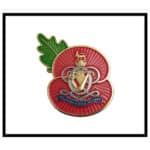‘Peter’ Lawrence, who died on 15th April 1991 was one of that intrepid group of German nationals whose family, persecuted by the Nazis for their Jewish origins, managed to leave Germany before the war and, when it began, joined the British Army to fight against the tyranny they hated.
Born in Berlin in 1918, Ludwig Julius, as he was christened, benefited from a good education, and when the family reached Ireland and settled in Belfast in 1936 he had no difficulty in entering Queen’s University.
There his intellectual ability and inclination led him to read classics and by the outbreak of war, he had obtained a BA (Hon) degree. But the war brought its inevitable penalties for all enemy nationals who were interned and sent, as prisoners-of-war, to Canada. There is required all his strength of character, insistence and determination to fight Hitler’s regime to get him returned to the U.K. where, in 1941, he was enlisted into the Auxiliary Pioneer Corps.
Two years later, his ability and hard work enabled him to transfer to the Royal Armoured Corps in which, in 1944, he was posted to the 8th Hussars in time for the invasion of Europe.
Joining with several other Germans, he was fond of recalling the inspiration they received from the words of welcome from the Commanding Officer, Lt.Col. Cuthy Goulburn, who assured them that whatever their background or nationality they would now be regarded as friends and companions in their new military family.
Peter served with the regiment from their landing in Normandy through to VE day near Hamburg. Throughout that long advance when the Reconnaissance Troop, to which he belonged, was frequently well to the fore, he ignored the added dangers that capture would have brought on him and never shirked a moment’s action, while frequently his commanding presence was a valuable asset in tranquilising frightened, angry and potentially dangerous groups of prisoners or even civilians.
His wartime history is a reminder of the moral strength shown by so many of his fellow Germans who had the courage to turn their backs on a hateful regime and fight for the common cause.
The ‘gentle giant’ as he is affectionately remembered, brought to soldiering a high intelligence and a lively, if pedantic, which smoothed many of the rough patches of life in a foreign army, and helped considerably to raise the academic standard of its W/T procedure. He finally found his metier amply fitted him to carry out a difficult task smoothly and efficiently.
Leaving the army in 1946 he was nationalised and served in the Army Reserve until 1952.
His first work after the war was at Nurnberg where he joined the U.S. Administration of the War Crimes Trials as a translator and interpreter. It was there he met his wife who he married in 1948 and returned to settle in England the following year, where he devoted himself to teaching music, and his family.
He was a happy man whose favourite quotation, as he squeezed himself into the inadequate seat of a scout car was ‘Deos fortioribus adesse’.
From an inauspicious start, Peter became a loyal Irish Hussar and a constant attendee at Association dinners and functions. He spread his benign goodwill to all those around him.



